I tend to get typecast a fair amount. As a fat guy with a stentorian voice who’s built like a Bavarian innkeeper and whose acting background is in open-bar comedy, I’m pretty readily pigeonholed into “comic relief” or “risible authority figure” roles. It’s not all bad–people are predisposed to laugh at what I say, which you can’t put a price on–but it does limit the number of shows I even bother auditioning for. I work with a couple of local theatre companies, and their commitment to diverse casting and showcasing marginalized actors is laudable–for less privileged people than me, it’s painful to be forced into a role that doesn’t match your hard-won and self-derived identity or to be excluded from opportunities because of the assumptions and stereotypes of others.
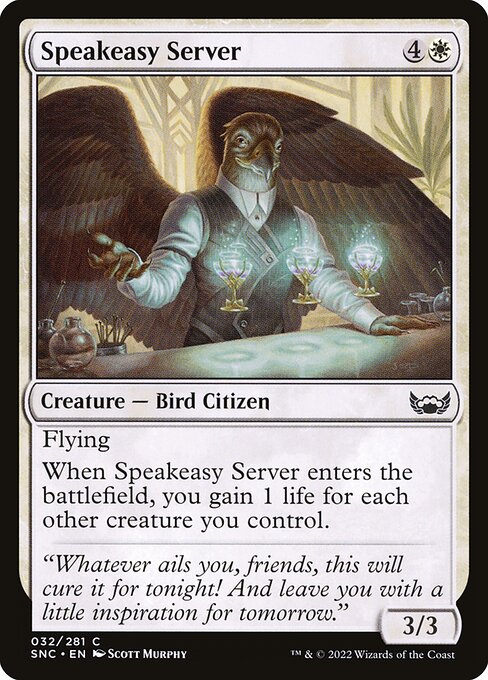
I thought of my–very cozy and societally supported–acting niche when we first started seeing previews for Wilds of Eldraine and the reveal of one of the set’s mechanics–ephemeral Auras called “Roles” that have intrinsic rules text and that replace each other if applied to the same creature. Personally, I’m leery of Roles–adding another layer of complexity is fine if justified, but my impression so far is that Roles are a case of the juice not being worth the mental squeeze (another member of the dubious group of mechanics like Mutate, Haunt, and Banding). In Eldraine Limited, it helps the format cohere–giving you Bargain material, changing combat math, powering up archetypes like Orzhov Aura sacrifice–but it’s taxing an already complicated game and adds a level of clutter to the battlefield that can be confusing for burgeoning players. Still, I wouldn’t call it a failure–it feels as though you’re slotting a character into a story when you slap a Royal or Young Hero Role on a humble Mouse or Knight, and it’s certainly less forgettable than, say, Coven or Adamant.
Of the six Roles given to us in the main set of Wilds of Eldraine (not including the seventh, Virtuous, from the Commander decks), Cursed is the most interesting. It can be deployed as a punishment for an opponent’s creatures (Diminisher Witch) or as a drawback on your own creatures (Cursed Courtier). It’s a bit confusing to have Auras that are Curses and an Aura token that’s Cursed (that can’t enchant players), but the flavor of shrinking a threat to a 1/1 vermin is great, and the potential of a Cursed creature shaking off the Aura and reverting to its original stats adds tension to Eldraine Limited. The other Roles are all upside; the ability for Cursed to serve as a drawback or pseudo-removal opens up a lot of design space, and I wouldn’t mind seeing it return.
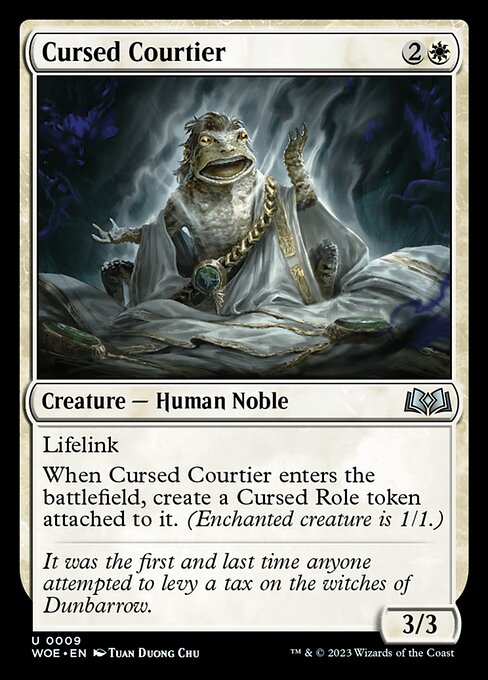
Wicked grants +1/+1 and a minor–but welcome–single loss of life when the Aura goes to the graveyard. Since a new Role causes the old to be sacrificed, your Wicked creature making a face turn will ping your opponent, as will sacrificing the Wicked Role to a Bargain card. Turning Rats into 2/2 berserkers has been a strategy that works well in Wilds of Eldraine Limited, particularly with the bomb that is Twisted Sewer-Witch. Various iterations of Blood Artist have taught us that death trigger damage can add up quickly, and Wicked can force your opponent to make suspect combat choices.
Monster Rancors up a target with +1/+1 and Trample–a simple boost that plays very well in Limited, particularly when Monstrous Rage and Ferocious Were-Fox can pass the Role out at Instant speed. Audacity stole some early wins in Brothers’ War Limited, but hasn’t done much since (even when replacing itself), but since Roles come as a minor bonus to already-reasonable cards, they could see Standard play. There’s a dearth of playable beneficial Auras in Standard, so we may have to turn to Roles to boost our creatures and trigger our Lord Skitter’s Blessing.
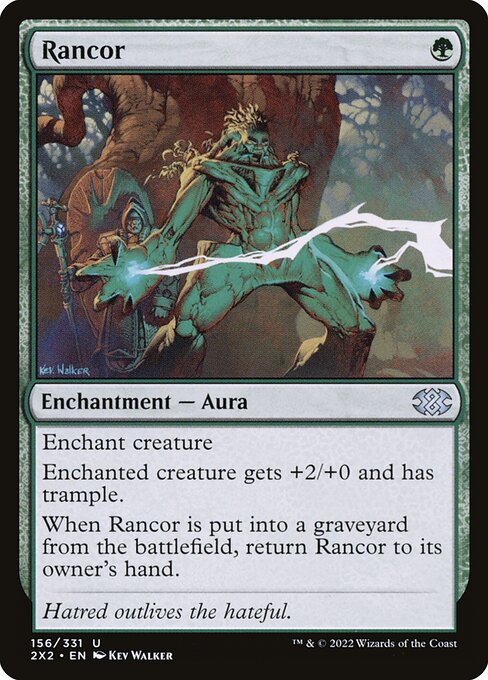
Both Wicked and Monster help you win the damage race in Limited, so they’re the two with which I’m most familiar so far. The others offer minor advantages in addition to a stats boost–or a potential stats boost in the case of Young Hero–but don’t have the security of Trample or an extra damage upon hitting the graveyard.
Sorcerer is about as simple as it gets: +1/+1 and a Scry 1 upon attack. Turning anything into a Sigiled Skink is always welcome, particularly when you’re upgrading your Faeries into Faerie Sorcerers, and turning multiple attackers into Sigiled Skinks can smooth a game immensely. Roles in Wilds of Eldraine are aggressive, encouraging attacks every turn to get free scry triggers, +1/+1 counters, and extra damage, and the format as a whole encourages hitting the red zone regularly. Flavorwise, it’s more “battlemage” than “sorcerer,” but it’s hard to find a simple and repeatable mechanic that can be balanced on a Role, and, as Johann’s predicament implies, wizardry in Eldraine is going to be a little more chaotic and combative than it is on Ravnica or Fiora. The wilds are creeping in as humanity sleeps, and that means magic is also growing more feral.
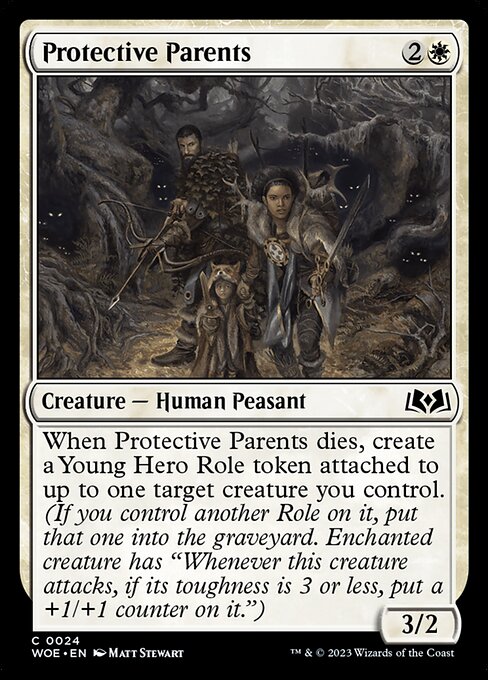
Young Hero is basically a gated Training that can only trigger a maximum of three times (not that Training ended up triggering more frequently than that) and is cost appropriately for that minimal benefit. You’re always happy to play Cut In for the four damage, and boosting a creature with a counter or two is welcome, as they’ll stick around when you Bargain away the Aura once your creature has three toughness. Return Triumphant is an especially welcome way to scale your smaller creatures up as the game goes on, and the story told by Protective Parents is right out of the Brothers Grimm. It’s low-impact on paper but powerful in play–a target that’s always impressive when Wizards hits.
Royal is probably the worst Role by a slim margin, granting Ward (1) in addition to the standard stat boost. Ward is always great, but taxing removal at one extra mana doesn’t do much, particularly when you can’t even stack Royal Roles. Your opponent is almost as happy with Candy Grapple at three mana as they are at two, but you can occasionally counter a removal spell from an injudicious opponent, thanks to the way Ward is worded.
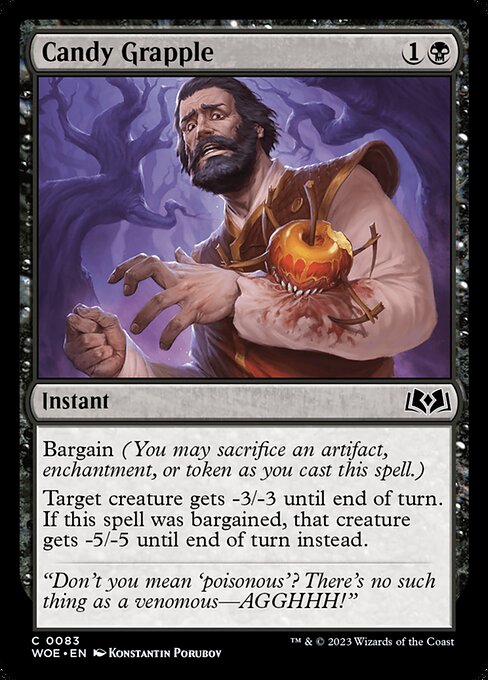
Auras are prone to card disadvantage–your opponent’s removal is trading for your creature and for your Aura–and Roles are part of a decades-long attempt to make Auras more attractive, from Rancor to Totem Armor to Bestow. Roles take this in a different direction by building them into the set’s mechanics and the format’s scope. Roles are an interesting design–they mostly play like +1/+1 counters, but their disposability, both in the sense of feeding Eldraine’s other mechanics and in their forced disposability if the Role-d creature gets hit with another Role, sets them apart. Flavorwise, they’re odd–Eldraine is a pretty standard-stakes Magic world, where a foot off the path gets you press-ganged by the fae folk or slam-dunked down a pasty abomination’s gullet. It feels off-theme to whimsically turn your Scream Puff into Royalty before turning it back into a Monster, and the meta aspect of Roles makes it feel more like you’re directing a play than participating in a fairy tale–which may, in fact, be the point. We may be just as subject to Ashiok’s sinister machinations or the oneiric pall of the plane-wide sleeping curse as our in-game characters: we may just be playing a role someone else has chosen for us, even as we pass out Roles ourselves.
Rob Bockman (he/him) is a native of South Carolina who has been playing Magic: the Gathering since Tempest block. A writer of fiction and stage plays, he loves the emergent comedy of Magic and the drama of high-level play. He’s been a Golgari player since before that had a name and is never happier than when he’s able to say “Overgrown Tomb into Thoughtseize,” no matter the format.



